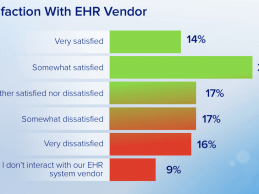Editor's Note: Brittni Brown is a current Masters candidate at the University of Idaho.
There is no doubt that technology has made a significant impact in the medical world. Advancements range from those that improve the comfort of many patients to those that extend their lives. Perhaps one of the most interesting technologies that has emerged onto the scene is one meant to more efficiently address geographical links to illnesses: geographic information systems, or
Read More
Health IT & Digital Health-Opinion | Op-Eds | Guest Columns | Analysis, Insights - HIT Consultant
RWJ State of Health IT in 2015: Is It Time to Adjust Expectations?
Context and perspective matter.
And it’s often both context and perspective that are lacking from the daily snapshots we get of health information technology, meaningful use, interoperability and the progress we are either making or not making, depending on your perspective.
So I welcome a report like the one the Robert Wood Johnson Foundation (RWJF) released last month on the state of health IT circa 2015 in these United States. Subtitled “Transition to a Post-HITECH World,” the
Read More
Applying Airbnb Data Principles to Health IT Interoperability
When we look outside the walls of traditional medicine, we can find innovative solutions that when applied appropriately, can create unforeseen benefits. Stuart Kauffmann, an evolutionary biologist and complexity systems researcher, proposed a theory where biological organisms can morph into more complex systems that expend less energy. The idea of increasing the complexity to gain some increased benefit has been applied to areas outside living organisms with some success.
Airbnb disrupted
Read More
Empower Patients: Give Them Better Data!
Editor's Note: William Rusnak, MD (@RusnakMD) is a resident radiologist, writer, and financial investor. He writes about topics such as healthcare technology, biotechnology, business, and entrepreneurship.
Imagine that you are diagnosed with serious illness. Wait. Maybe that is a little strong. Sadly, however, there really is no good way to start this conversation. In any case, how do you perform your medical research? If you're like most people -- 77% to be specific -- you run straight to Dr.
Read More
How Home Health Software Improves Provider-Patient Relationships
Consider the typical provider-patient relationship: Patient visits the doctor. Doctor conducts examination, provides diagnosis, advice, and a plan for treating the illness. The doctor might even provide advice for better overall health. Patient leaves the office, where he or she may or may not follow through on the doctor’s suggestions.
From here, health care is largely in the hands of the patient. In fact, by some estimates, the majority of health care takes place outside of a provider’s
Read More
Why I Despise my EHR, But I’m Still Using It
Modern electronic health records (EHRs) have become the norm in U.S. health care — nearly 80 percent of office-based physicians use them, up from 40 percent in 2009, according to federal data. But while adoption is up, satisfaction has plummeted. In 2010, about 61 percent of physicians liked their EHRs (were satisfied or very satisfied, according to periodic AMA surveys). This dropped to 48 percent in 2012, and in 2014 satisfaction rates were only 34%. Physicians have come to
Read More
10 Ways Artificial Intelligence Could Make Me a Better Doctor
Editor's Note: Bertalan Mesko, MD, PhD is a medical futurist who envisions the next trends for companies and governments in order to make sure a mutually positive relation between the human touch and innovative technologies will rule the future of healthcare. He is an international speaker, consultant, geek physician with PhD in genomics, and founder of Webicina.com. He is the author of the recent book, "The Guide to the Future of Medicine”.
I was watching the movie Her for the second
Read More
Why I’ve Tried Every Wearable and Abandoned 99% of Them
Editor's Note: Tasso Roumeliotis is the CEO and Founder of Location Labs by AVG, a global pioneer in mobile security for humans and is an expert in mobility. Prior to Location Labs, Tasso was a Vice President at Claridge, a $3 billion fund with wireless and media assets.
In the past 5 years, I’ve tried more than 2 dozen wearable devices. Some for less than a week, some only once, but very few have become part of my lifestyle.
Now, I’m not necessarily your average user. You could say
Read More
Will the Home Become the Healthcare Center of the Future?
Editor's Note: Editor’s Note: Stuart Karten is the principal of Karten Design, a product innovation consultancy creating positive experiences between people and products specializing in health technology. This is an essay adapted from a talk he will give at the 2015 USC Body Computing Conference on October 9, 2015.
Our design firm has been studying how the future of medicine is becoming “invisible”—powerful, ubiquitous, and intuitive. In most cases, technology has outpaced design. In its
Read More
5 Things Hospitals Can Learn About Patient Engagement From Netflix
Since its inception in 1997, the video streaming and DVD distribution company Netflix has grown into an internationally recognized giant in the entertainment world. In July of this year, the business reported that its subscriber base had grown to 65.55 million, according to Business Insider. There's no denying that the company has captured the attention of its target audience.
Netflix understands what drives the modern consumer and has carefully tuned and shaped its offerings and service
Read More










